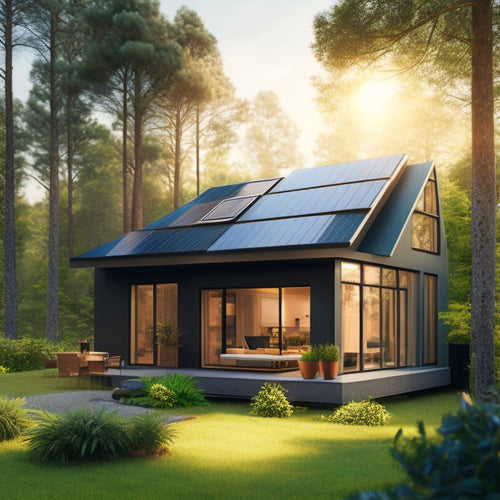
Solar Power Units Perfect for Homes
Share
You're considering installing a solar power unit in your home, a decision that can notably reduce your reliance on traditional energy sources, minimize your environmental impact, and provide energy independence. With various types of solar power units available, including monocrystalline, polycrystalline, and thin-film panels, it's essential to evaluate your specific needs and budget. Factors like solar irradiance, temperature, and shading also impact efficiency. By understanding how solar power units work and their components, you'll be better equipped to choose the right unit for your home and maximize its benefits - now, take the next step to utilize the power of solar energy.
Key Takeaways
- Solar power units reduce reliance on traditional energy sources, minimizing environmental impact and carbon footprint.
- High-efficiency solar panels, inverters, and power storage systems are crucial components for maximizing energy output and independence.
- Factors such as solar irradiance, temperature, shading, and panel age affect efficiency, making optimal installation and maintenance essential.
- Professional installation and regular cleaning/maintenance ensure optimal performance, longevity, and reliability of solar power units.
- Solar power units provide financial incentives like tax credits, rebates, and increased home value, making them a worthwhile long-term investment.
Benefits of Solar Power Systems
Most households can greatly reduce their reliance on traditional energy sources by installing solar power systems. By doing so, you'll not only minimize your environmental impact but also enjoy energy independence.
With financial incentives like tax credits and rebates, the cost of converting to renewable energy is more feasible than ever. As a grid alternative, solar power systems allow you to generate your own energy, reducing your reliance on utility bills. This, in turn, increases your home value and provides long-term sustainability benefits.
By utilizing the power of the sun, you'll considerably decrease your carbon footprint and energy savings will add up over time. In fact, you can save up to 50% on your energy bills, depending on your location and system size.
Types of Solar Power Units
Now that you've decided to harness the power of the sun, it's time to explore the various types of solar power units available for your home.
You'll find that there are several solar panel types to choose from, each with its own strengths and weaknesses. Monocrystalline silicon panels offer high efficiency but are more expensive, while polycrystalline silicon panels provide a more affordable option with slightly lower efficiency. Thin-film panels are another option, offering flexibility and lower costs, but with even lower efficiency.
When it comes to converting DC power from your solar panels to AC power for your home, you'll need a solar inverter.
There are three main solar inverter types: string inverters, microinverters, and power optimizers. String inverters are the most common, connecting multiple panels in a series. Microinverters, on the other hand, are attached to each panel, providing more flexibility and monitoring capabilities. Power optimizers offer a hybrid approach, optimizing energy output at the panel level before sending it to a central inverter.
Each type has its own benefits and drawbacks, so it's crucial to evaluate your specific needs and budget when selecting a solar power unit.
How Solar Power Units Work
You're about to learn how solar power units convert sunlight into usable energy for your home.
This process involves a fascinating energy conversion process, where photovoltaic cells in solar panels capture sunlight and change it into electrical energy.
You'll also find out how solar panel efficiency and power storage systems play a critical role in optimizing your solar power unit's performance.
Energy Conversion Process
Several photovoltaic (PV) cells, arranged in a grid-like pattern, form a solar panel, which is the core component of a solar power unit. These cells convert sunlight into electrical energy through a process known as photovoltaic technology. As you install a solar power unit, you're utilizing the energy conversion capabilities of these cells.
Here's how it works:
| Step | Process | Result |
|---|---|---|
| 1 | Sunlight hits the PV cells | Excitation of electrons |
| 2 | Electrons flow through the material | Creation of electrical current |
| 3 | Current is directed through an inverter | Change to alternating current (AC) |
| 4 | AC power is fed into your electrical panel | Powering your home's devices |
As you generate electricity, you're reducing your reliance on traditional power sources and lowering your energy bills. With a solar power unit, you're taking control of your energy consumption and producing clean, sustainable power for your home.
Solar Panel Efficiency
Your solar power unit's performance hinges on the efficiency of its solar panels, which is critical to maximizing your energy output.
The efficiency of your solar panels depends on the type of solar panel materials used and the level of solar technology advancements incorporated into the design.
Here are three key factors that impact solar panel efficiency:
-
Photovoltaic (PV) Cell Efficiency: The efficiency of individual PV cells, which convert sunlight into electrical energy, directly affects the overall performance of your solar power unit.
-
Thermal Coefficient: The thermal coefficient measures how well your solar panels can withstand high temperatures, which can reduce their efficiency.
-
Reflection and Absorption: The reflective properties of your solar panels' surface and their ability to absorb sunlight also influence their efficiency.
Power Storage Systems
As the solar panels generate electricity, the power storage system kicks in to guarantee a steady supply of energy to your home. This system is comprised of advanced battery technologies designed to optimize energy storage and management.
When the sun is shining, your solar panels produce electricity, and any excess energy is stored in your power storage system. This stored energy is then used to power your home when the sun isn't shining, ensuring a continuous supply of electricity.
The power storage system's energy management capabilities allow you to monitor and control your energy usage in real-time. This enables you to optimize your energy consumption, reducing your reliance on the grid and minimizing your energy bills.
With a power storage system, you can enjoy a reliable and efficient supply of energy, even during power outages or grid failures. By integrating advanced battery technologies with intelligent energy management, your solar power unit provides a seamless and sustainable energy solution for your home.
Solar Power Unit Components
You'll need to understand the components that make up a solar power unit to get the most out of your system.
The solar panel array is a critical component, as it converts sunlight into electrical energy - its size and efficiency will impact your system's overall performance.
You'll also need to evaluate system mounting options, which can range from rooftop installations to ground-mounted systems, and affect the unit's durability and maintenance requirements.
Solar Panel Array
Within a solar power unit, the solar panel array is the most vital component, comprising multiple solar panels wired together to generate a substantial amount of electricity.
You can think of it as the heart of your solar power system, converting sunlight into electrical energy. The array's performance is essential in determining the overall efficiency of your solar power unit.
To maximize energy output, you'll want to make sure your solar panel array is equipped with the latest solar panel technology and innovations.
Here are three key considerations:
- Efficiency rating: Look for high-efficiency solar panels that can generate more power per unit area.
- Panel configuration: The arrangement of panels can impact energy output. Consider a configuration that minimizes shading and optimizes energy production.
- Inverter compatibility: Verify your inverter is compatible with your solar panel array to optimize energy conversion and reduce energy losses.
System Mounting Options
Your solar power unit's system mounting options play an essential role in guaranteeing the stability and longevity of your solar panel array.
You'll need to choose from ground mounts, roof mounts, or pole mounts, each with its advantages and limitations. Ground mounts offer flexibility in installation angles, while roof mounts are ideal for roofs with sufficient space. Pole mounts, on the other hand, are suitable for small arrays or where roof space is limited.
When selecting a mounting option, consider aesthetic considerations, durability factors, and local regulations.
You'll also need to account for seasonal adjustments, as the best installation angle may vary throughout the year. Weather impacts, such as high winds or heavy snowfall, must also be factored in.
Additionally, tracking systems can be integrated into your mounting system to enhance energy production.
Factors Affecting Efficiency
When it comes to utilizing solar energy, maximizing system efficiency is vital to reap the most benefits. As you contemplate installing a solar power unit for your home, it's important to understand the factors that affect its efficiency.
Several factors can impact your solar power unit's performance. Here are three key ones to take into account:
-
Solar Irradiance and Geographical Location: The amount of sunlight your location receives affects your system's efficiency. Areas with high solar irradiance, such as regions near the equator, will generally produce more power than areas with low solar irradiance.
-
Temperature Effects and Orientation Angle: High temperatures can reduce your system's efficiency, while a favorable orientation angle can maximize energy production. Make certain your system is installed at an angle that allows for maximum energy absorption.
-
Shading Impact and Panel Age: Shading from trees, buildings, or other obstacles can greatly reduce your system's efficiency. Additionally, as your solar panels age, their efficiency will decrease, affecting your overall energy production.
Installation and Maintenance
Most solar power units require a one-time installation, and a well-planned setup guarantees peak performance and longevity. You'll want to verify your system is designed and installed by a professional to maximize energy production. The installation timeline typically ranges from a few days to several weeks, depending on the system size and complexity.
| System Size | Installation Timeline | Maintenance Requirements |
|---|---|---|
| Small (2-5 kW) | 2-5 days | Quarterly panel cleaning, annual inverter check |
| Medium (5-10 kW) | 5-10 days | Bi-monthly panel cleaning, semi-annual inverter check |
| Large (10-20 kW) | 10-20 days | Monthly panel cleaning, quarterly inverter check |
| Custom | Varies | Customized maintenance schedule |
After installation, regular maintenance is essential to ascertain your system operates at peak levels. You'll need to clean your solar panels regularly to remove dirt and debris, and perform routine checks on your inverter and other system components. By doing so, you'll enjoy a reliable and efficient source of renewable energy for years to come.
Cost and ROI Analysis
Now that your solar power unit is installed and running smoothly, it's time to examine the financial benefits. As a homeowner, you're likely curious about the cost and ROI analysis of your new solar power system.
When it comes to financing options, you have several choices. You can pay cash upfront, finance through a loan, or lease the system. Each option has its pros and cons, so it's crucial to evaluate your choices carefully.
Here are three key factors to take into account in your cost and ROI analysis:
-
Tax Incentives: The federal government offers a 26% tax credit for solar power system installations, which can greatly reduce your upfront costs.
-
Energy Savings: With a solar power system, you'll generate free electricity and reduce your reliance on the grid, leading to considerable savings on your utility bills.
-
Increased Property Value: A solar power system can increase your property value, making your home more attractive to potential buyers if you decide to sell in the future.
Popular Solar Power Brands
With a clear understanding of the cost and ROI analysis, you're likely enthusiastic to investigate the top solar power brands that can help you achieve your renewable energy goals.
You'll want to research and compare brands to find the best fit for your specific needs. Brand comparisons are essential, as they help you evaluate the strengths and weaknesses of each brand.
Look for brands that offer high-efficiency panels, durable equipment, and thorough warranties. You should also consider customer reviews, as they provide useful perspectives into the brand's performance, installation process, and customer support.
Some popular solar power brands include SunPower, Panasonic, and Tesla. These brands are known for their high-quality products, innovative technology, and excellent customer service.
When evaluating these brands, pay attention to their certifications, such as UL and IEC, which guarantee their products meet international safety and performance standards.
Choosing the Right Unit
Choosing the Right Unit
Selecting the right solar power unit for your home requires careful consideration of several key factors, including your energy needs, budget, and available space.
You'll need to determine how much power you require to cover your energy needs, factoring in the size and type of appliances you use.
To get started, consider the following:
-
Unit sizing: Calculate the size of the solar power unit you need based on your energy requirements. A larger unit may not always be the best option, as it may not be suitable for your roof size or budget.
-
Energy needs: Assess your energy usage patterns to determine the amount of power you need to generate. This will help you choose a unit that can meet your energy demands.
-
Installation requirements: Consider the installation requirements, including the space available on your roof, local building codes, and any necessary permits.
Frequently Asked Questions
Can I Install a Solar Power Unit Myself to Save on Labor Costs?
You can attempt a DIY installation to save on labor costs, but be aware that incorrect wiring and panel placement can negate cost savings and even void your warranty, so it's essential to weigh the risks.
Are Solar Power Units Suitable for Homes With Shady Roofs?
You'll need to assess your shady roof considerations when evaluating solar power units, as shading reduces energy output; however, you can investigate alternative energy solutions, like optimizing panel placement or using high-efficiency panels to minimize losses.
Do Solar Power Units Provide Power During a Grid Outage?
You're not stuck in the dark! With off-grid systems and battery storage, you'll have power 24/7, even during grid outages, and you'll be the envy of your neighbors, enjoying uninterrupted electricity while they're left in the dark, literally!
Can I Expand My Solar Power Unit in the Future if Needed?
You can easily expand your solar power system in the future if needed, thanks to its future scalability, ensuring system compatibility with additional panels or components, allowing you to increase energy output and meet growing power demands.
Are Solar Power Units Covered by a Warranty or Guarantee?
As you traverse the uncharted territory of renewable energy, you'll find solace in knowing that your investment is safeguarded - most manufacturers offer extensive warranty coverage and performance guarantees, giving you peace of mind and protection for your system's lifespan.
Related Posts
-

Why Go Green With Automotive Products Online?
By switching to eco-friendly automotive products online, you're taking a significant step towards reducing your carbo...
-

Top 10 DIY Conversion Kit Reviews and Tips
You're taking the first step towards electrifying your ride, and with the right DIY conversion kit, you'll be cruisin...
-

Reduce Solar Panel Cost for Your Small Home
By evaluating your energy needs, choosing the right installer, and selecting cost-effective solar panel options, you ...


